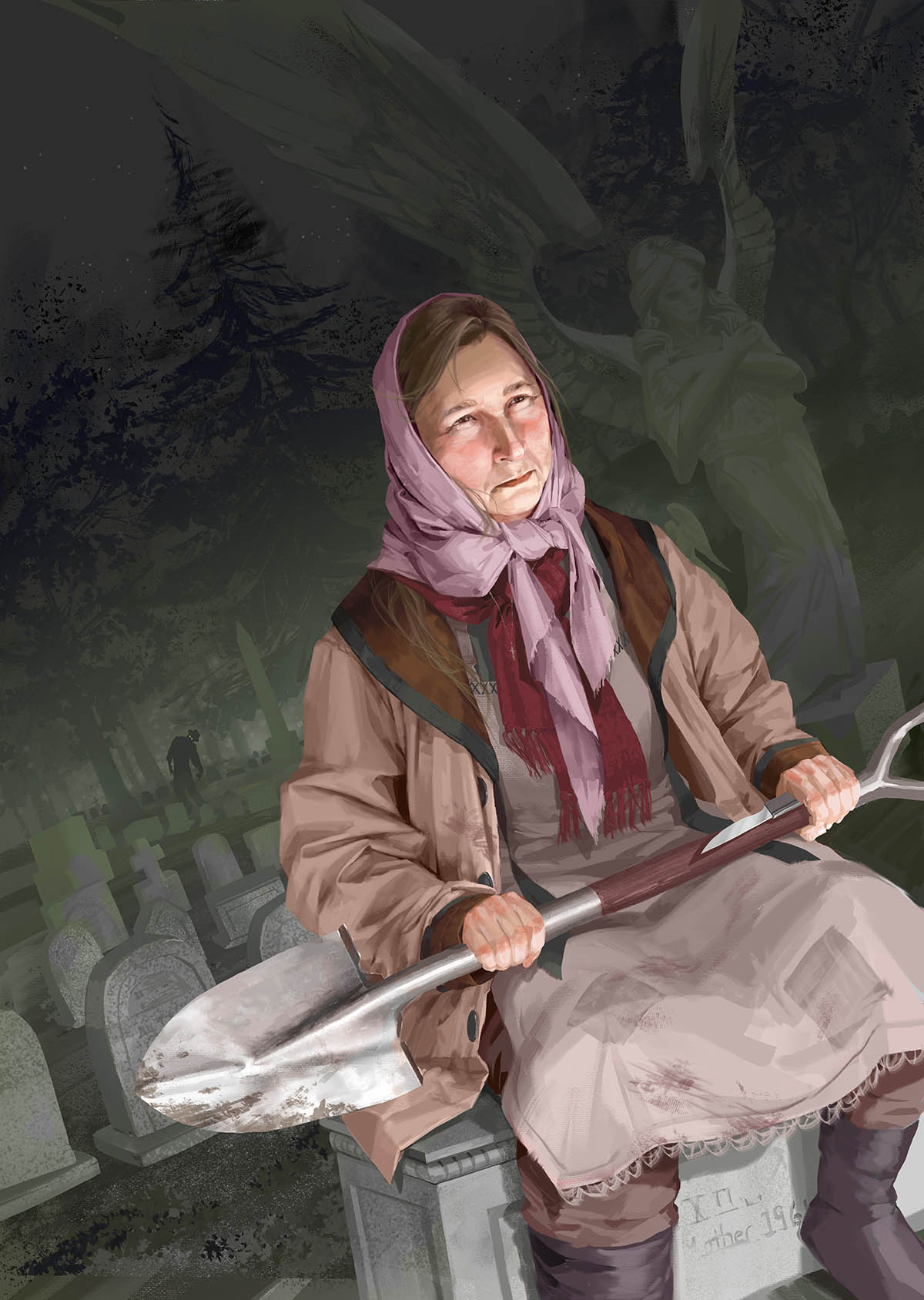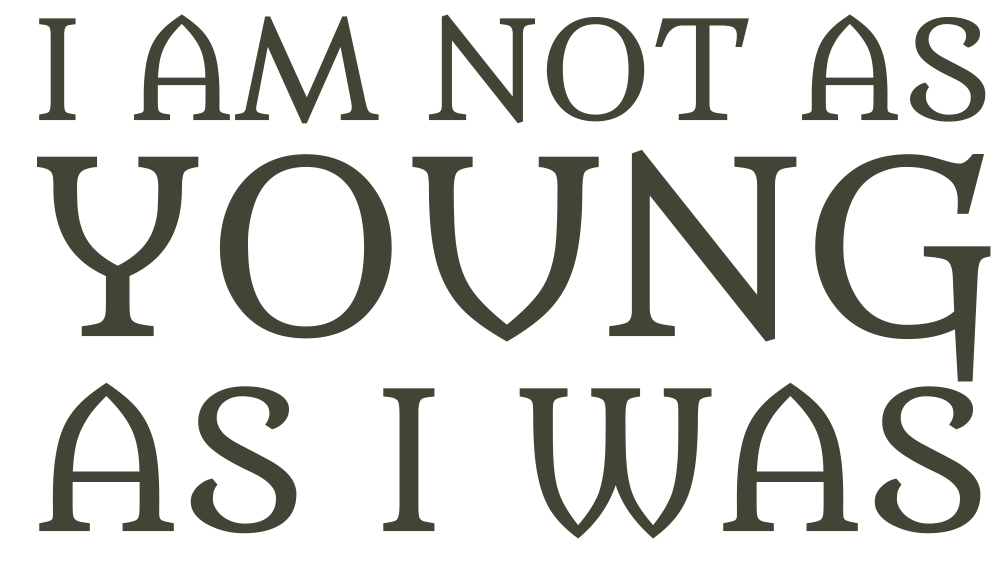 |
Climbing the wall, I remembered I am not 20.
When I was twenty, I was in the army. I fought at Leningrad, cold, starving. I fought for months, until the damned Nazis retreated. Then we followed the bastards into Poland, into Germany, into Berlin itself.
In those days, I was a sharpshooter. I killed Nazis. They had killed my little brother. Shot my mother in the dooryard of her house. Of course, I killed them.
Then the peace came. No more need for sharpshooters. I had a job in an office, sorting files, a reward for my service in the Great Patriotic War. Until my boss was arrested, and I got word from a friend that I would be arrested too. So, instead of going to work that morning, I went to Finland.
I walked, mostly at night. It wasn’t winter, so it wasn’t bad, except for being afraid of the police. But I made it. I crossed the border. They let me stay. I applied to come to America. I wrote to my cousin in Castle Shannon, Pennsylvania. She and her husband agreed to sponsor me. So, I came to America, and went to work cleaning houses.
|
Three nights a week, I go to school to learn English, and study for citizenship. Next year I will be a real American, and I will go to a business school. There are plenty of people who would like a secretary who speaks Russian.
My cousin, Anna, doesn’t like it that I go out by myself at night. “It isn’t safe.” she says. “Not for a woman.” But Dimitri does not like to miss his television, so if I want to go to night school, I have to go by myself.
One night, a boy comes up to me as I am waiting for the bus. He has a knife in his hand. “Give me your purse!” he says. “Or you’ll get this.”
I took his arm, and twisted it behind his back, until he dropped his knife. “Run home to your mother.” I told him. “Tell her from me to give you a good beating.”
He ran away down the street, and I kept his knife, with the blade that goes back into the handle. I don’t think he knew that women could fight.
I clean for the Rileys and the Wilsons, the Kellers and the Stones, to earn money. They are nice people. Mrs. Stone gave me her old typewriter. So, I do my best for them. I would do my best anyway.
Mrs. Keller’s sister is getting married, so she’s very busy. Sometimes I stay with her children, at night. Not on the nights when I go to school. She understands about that. But other nights, especially Fridays, when she and her sister talk about the wedding, or maybe there is a party. I will stay with Susie and Bobby. They are good children. They do what I tell them to do. They like the stories I tell them about Baba Yaga, the witch who lives in the forest.
Susie asked me if Baba Yaga was real. I said no. She is a story made up to scare children. Bobby says he isn’t scared of Baba Yaga. But his eyes get very big when I tell him about the skulls on her fence.
Mrs. Keller went to a shower for her sister. That’s a party where the bride gets presents. She came home tipsy, so I took the bus back to my cousin’s house. The bus stop is across from the cemetery. That was when I saw him for the first time.
His eyes were very bright. Like two headlights on a car. He did not move like a living person. They don’t. They’re dead. Their arms and legs can’t move the way they did, when they were alive. I saw him jumping over the cemetery wall. I found the cross I wear around my neck and held it. But he didn’t come near me. He has found someplace else to hunt.
I said she must keep her children inside, while the dog is running loose. She said she would, and I felt better.
But I knew it was no Doberman dog that killed the handyman.
Every day, the daylight was a little less, and he would come out a little sooner. I knew this.
I asked questions. In Russia asking questions was dangerous, so I learned young to ask them carefully.
From Pavel, who works in Alexi’s bar on Sarah Street, I learned that two men who used to drink there bought guns and tried to rob a gas station in Homestead.
The gas station owner had a gun too. He had been in the army. He shot one of them. The other man took his partner and ran to their car. Neither one of them had been seen since.
Pavel thought they must have left the state. I thought one of them must have left the state. The other, I was sure, was still here.
From my teacher, at the school, I am learning how to use the library to look things up. In the library, they have newspapers from last week, and the week before and the week before that.
In one of them, I read, Veteran Foils Gas Station Robbery. Foils means stops. That is how I learned that the robbery happened in June, just a little before I saw that thing in the cemetery.
They publish, in the newspapers, little stories about people who have died. After I read about the robbery, I looked at all the little stories. Ten people died on the day of the robbery. I read when each of their funerals were, and where they were.
Only two near the Kellers’ house. That made it easy.
On a nice Sunday, I put on my good clothes, and took the bus out to the cemetery. I took a bunch of flowers with me. Nobody thought I was strange. I went walking among the graves, until I found the one I wanted.
I saw it on my cousin’s television once. Gangsters wanted to get rid of a body, so they buried it in a freshly dug grave. Maybe the robber saw that same show. Or maybe he got the idea on his own.
The grave was not as it should be. The soil was fresh. Though the burial had been five months ago. Someone had put a wreath there, but the wreath had been cast aside. I knew this was where he rested during the day.
If you bury a bad man in consecrated ground, it is an offense to God. An evil spirit comes into the body, and causes it to walk, and to feed off the innocent.
So, I marked the grave with my flowers. Then I had to wait. Such a long wait. Monday, back to work, mopping floors, washing clothes, ironing shirts and school. Tuesday, cleaning Mrs. Stone’s kitchen. Wednesday, the Rileys, all those diapers to wash, then school again. Thursday is Mrs. Keller, and more school. I cannot do what I have to do before Sunday, when nobody will be out to see me.
Last Saturday night.
I told Pavel to drive me up to the cemetery. I have slacks on tonight, that I borrowed from Dimitri. I also borrowed his shovel and his hatchet. I have the knife that goes back into its handle that I took from the boy.
Pavel doesn’t ask questions. He doesn’t offer to help either. He just asks me if I’m sure I want to be outside the cemetery at night. I told him I’m sure.
I climbed the wall. It wasn’t high. But I am not as young as I was in the war. The climb was hard.
Then I waited.
It was like when I went to Finland, in the cold and the dark. Hoping the police would not see me. I waited, where I had seen him the last time. Held my cross and prayed to all the saints to keep me safe.
I saw his eyes, bright with the light of Hell. Over the wall, and into a pile of leaves. I held my breath. But he knew I was there. He came toward me. I held my cross and prayed to all the saints, and the sun was just coming up on the horizon.
He made an ugly noise and ran toward his grave. Maybe he thought he would be safe once he was beneath the earth.
I waited until the first light. Sunday, no one was out so early. Everyone was enjoying a little rest today. So, I dug. I didn’t have to dig far. Not more than a meter. There he was. Not like Lugosi, in his evening clothes. Like a man who robs gas stations, in corduroy pants and a plaid shirt.
So, I did what had to be done. He was full of fresh blood, and it was messy. But he is truly dead now. He can do no more harm. I left him, exposed to the day. Let the police find him. I don’t know what they will think. But they will not think that the lady who does the Kellers' washing dug this thing up and destroyed it.
Pavel was waiting, outside the cemetery. He did not ask questions. He had coffee and doughnuts, and a wet cloth, for me to wipe my hands.
“You look tired, Masha,” he said.
“I am not twenty anymore.” I told him. “Some things are harder for me now.”
|

